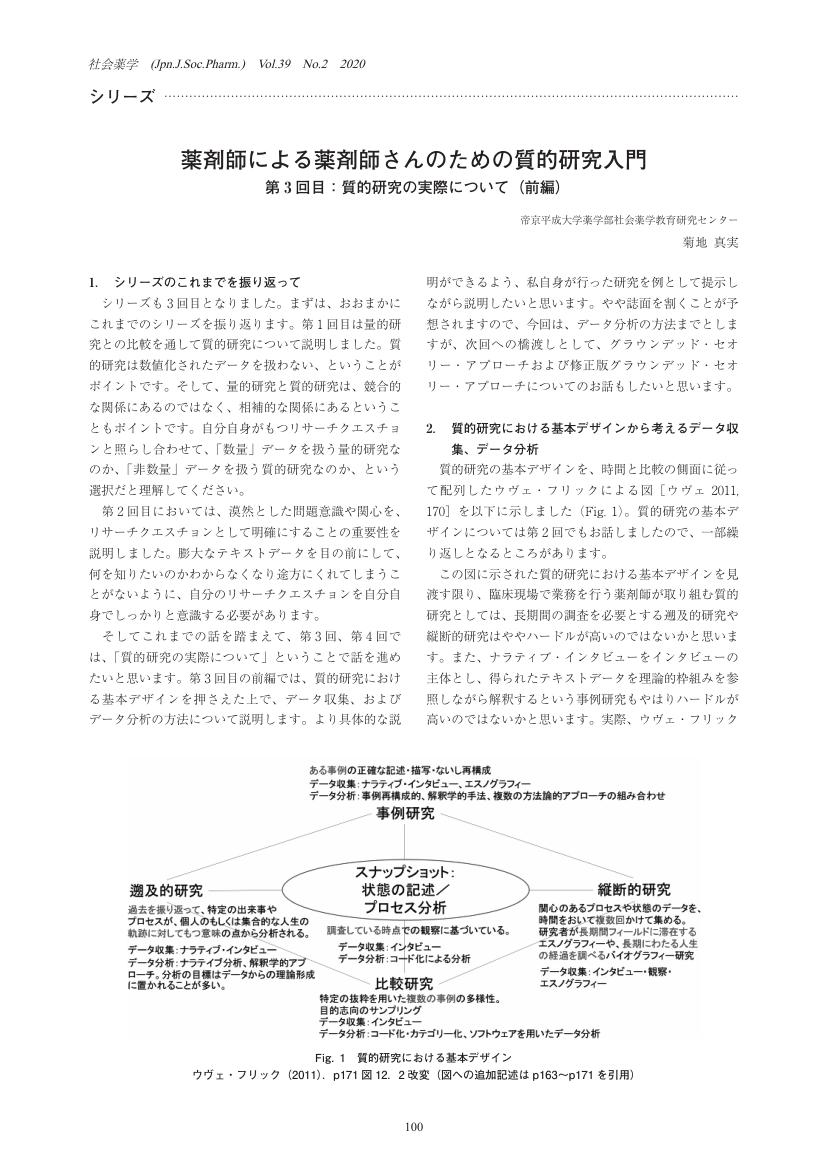5 0 0 0 OA 在宅医療にかかわる薬剤師の患者に対する直接接触行為に関する研究─必要性の認識と行為頻度─
- 著者
- 菊地 真実 辻内 琢也
- 出版者
- 日本社会薬学会
- 雑誌
- 社会薬学 (ISSN:09110585)
- 巻号頁・発行日
- vol.35, no.1, pp.10-22, 2016-06-10 (Released:2016-07-06)
- 参考文献数
- 22
A questionnaire-based survey was administered to determine how community pharmacists recognize the necessity for and frequency of touching their patients during care giving. The questionnaire was sent to 400 community pharmacies that practiced home care, and 147 valid responses were analyzed. The survey suggested that acts recognized by pharmacists to require touching were measuring vital signs and helping patients take oral medications. It was thought that pharmacists needed to help patients in taking oral medications and also needed to determine issues related to oral intake. The survey also indicated that the frequencies of measuring vital signs and applying plasters to patients were high. Measuring vital signs was considered routine work, and applying plasters to patients was considered occasional work. Many respondents stated the need for practical study sessions on measuring vital signs. The frequency of measuring vital signs has increased because pharmacists have increasingly recognized this need. Additionally, females tended to touch their patients more frequently than males. However, there was no relationship between the frequency of examining bedsores and applying ointments on them and gender because it was thought that knowledge and experience were more important. The recognition of necessity for touching their patients was high but the frequency was comparatively low, and there was a discrepancy between the recognition of necessity and frequency. It was suggested that practical study sessions on when patients should be touched should be a high priority.
- 著者
- 菊地 真実
- 出版者
- 日本社会薬学会
- 雑誌
- 社会薬学 (ISSN:09110585)
- 巻号頁・発行日
- vol.38, no.2, pp.61-65, 2019-12-10 (Released:2019-12-24)
- 参考文献数
- 2
- 著者
- 菊地 真実 辻内 琢也
- 出版者
- 日本社会薬学会
- 雑誌
- 社会薬学 (ISSN:09110585)
- 巻号頁・発行日
- vol.34, no.2, pp.81-96, 2015-12-10 (Released:2015-12-25)
- 参考文献数
- 25
- 被引用文献数
- 1
A questionnaire-based survey was conducted to clarify how community pharmacists recognize the legal validity of acts that involve touching their patients and to determine if the pharmacists had personal feelings of resistance toward particular acts. The questionnaire was sent to 400 community pharmacies that practiced home care and 147 valid responses were analyzed. The survey suggested that there were many pharmacists who had no objection toward measuring vital signs, such as temperature and blood pressure. Additionally, they recognized that it was necessary for doctors, other professionals, and patients to recognize their ability to measure vital signs. The survey also suggested that there were strong feelings of resistance toward invasive acts, such as insertion of an enema tube or a suppository. It was considered that these feelings were due to insufficient knowledge and experience, as well as uneasiness with hygiene issues. The necessity to participate in a practical study session was emphasized. When pharmacists recognized a problem with the legality of an act, their feelings of resistance, particularly toward examining bedsores and applying ointment on them, tended to become strong. Therefore, it was suggested that pharmacists may be able to perform the acts without feelings of resistance if the legality of the acts was clarified. Based on these findings, it is necessary to find a suitable rationale for performing each act, so that pharmacists will be able to perform the acts that involve touching their patients without feelings of resistance.
1 0 0 0 OA 薬剤師による薬剤師さんのための質的研究入門 第3回目:質的研究の実際について(前編)
- 著者
- 菊地 真実
- 出版者
- 日本社会薬学会
- 雑誌
- 社会薬学 (ISSN:09110585)
- 巻号頁・発行日
- vol.39, no.2, pp.100-105, 2020-12-10 (Released:2020-12-30)
- 参考文献数
- 7
1 0 0 0 OA 薬剤師による薬剤師さんのための質的研究入門
- 著者
- 菊地 真実
- 出版者
- 日本社会薬学会
- 雑誌
- 社会薬学 (ISSN:09110585)
- 巻号頁・発行日
- vol.39, no.1, pp.40-42, 2020-06-10 (Released:2020-07-01)
- 参考文献数
- 4

